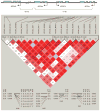Pharmacogenetic association of the APOA1/C3/A4/A5 gene cluster and lipid responses to fenofibrate: the genetics of lipid-lowering drugs and diet network study
- PMID: 19057464
- PMCID: PMC2733171
- DOI: 10.1097/FPC.0b013e32831e030e
Pharmacogenetic association of the APOA1/C3/A4/A5 gene cluster and lipid responses to fenofibrate: the genetics of lipid-lowering drugs and diet network study
Abstract
Background: The apolipoproteins (APOA1/C3/A4/A5) are key components in modulating lipoprotein metabolism. It is unknown whether variants at the APOA1/C3/A4/A5 gene cluster are associated with lipid response to pharmacologic intervention.
Methods and results: Plasma triglycerides (TGs) and high-density lipoprotein (HDL) levels were measured in 861 Genetics of Lipid-Lowering Drugs and Diet Network study participants who underwent a 3-week fenofibrate trial. We examined 18 common single nucleotide polymorphisms (SNPs) spanning the APOA1/C3/A4/A5 genes to investigate the effects of variants at the gene cluster on lipid response to fenofibrate treatment. We found that the minor alleles of the SNPs rs3135506 (APOA5_S19W), rs5104 (APOA4_N147S), rs4520 (APOC3_G34G), and rs5128 (APOC3_3U386) were associated with enhanced TG response to fenofibrate treatment (P= 0.0004-0.018). The minor allele of SNP rs2854117 (APOC3_M482) was associated with reduced rather than enhanced TG response (P= 0.026). The SNP rs3135506 (APOA5_S19W) was associated with HDL response, with minor allele related to reduced HDL response to fenofibrate (P= 0.002). Association analyses on haplotype provided corroborative evidence to single SNP association analyses. The common haplotypes H2, H3, and H5 were significantly associated with reduced TG response to fenofibrate.
Conclusion: The genetic variants at APOA1/C3/A4/A5 gene cluster may be useful markers to predict response of lipid-lowering therapy with fenofibrate. Further studies to replicate/confirm our findings are warranted.
Figures


References
-
- Krauss RM. Triglycerides and atherogenic lipoproteins: rationale for lipid management. Am J Med. 1998;105:58S–62S. - PubMed
-
- Malloy MJ, Kane JP. A risk factor for atherosclerosis: triglyceride-rich lipoproteins. Adv Intern Med. 2001;47:111–136. - PubMed
-
- Suter PM, Gerritsen-Zehnder M, Hasler E, Gurtler M, Vetter W, Hanseler E. Effect of alcohol on postprandial lipemia with and without preprandial exercise. J Am Coll Nutr. 2001;20:58–64. - PubMed
-
- Durstine JL, Grandjean PW, Davis PG, Ferguson MA, Alderson NL, DuBose KD. Blood lipid and lipoprotein adaptations to exercise: a quantitative analysis. Sports Med. 2001;31:1033–1062. - PubMed
Publication types
MeSH terms
Substances
Grants and funding
LinkOut - more resources
Full Text Sources
Medical
Molecular Biology Databases
Miscellaneous

